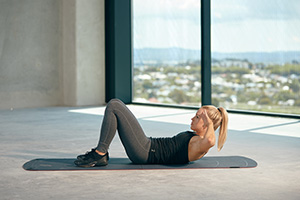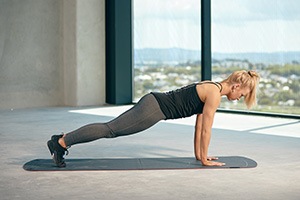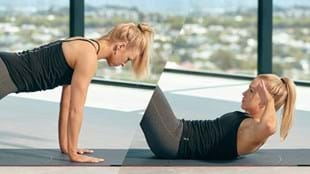If you’re keen to find the smartest way to work your abs – and enjoy the increased stability, and lower risk of injury that comes from a strong core – here’s where you’ll find it.
Should you plank, or should you crunch?

The crunch is a dynamic movement. It’s a spinal flexion – a forward bend of the spine.

The plank is a static hold. An isometric contraction of the muscles of the spine.
What muscles do you work?
Both the crunch and the plank engage the rectus abdominis and the obliques. However, the plank also targets the erector spinae, the glutes, hip flexors, quads and deltoids.
Why we love these moves
- The crunch is great for isolated conditioning.
- The plank provides increased activation of target muscles and functional strength benefits.
Science shows...
In 2013 the Les Mills research team explored which type of abdominal exercise – isolation or integration – provokes the greater muscle activation. This study highlighted:
- A plank with hand reach gives 20 percent more rectus abdominis activation than a crunch.
- A plank with a knee lift toward the opposite side of the chest increases rectus abdominis activation by 30 percent and external Oblique activation by 20 percent.
THE VERDICT: the plank is the winner
While the humble crunch can work wonders for your core, the plank provides optimal results when it comes to aiding sports performance, rehab and general fitness. So, if you really want to maximize the benefits of your core training the increased muscle activation you get with a plank means it’s the way to go.
When to choose crunches over the plank
If you have weak wrists or shoulders choosing to challenge your core with crunches may be the best bet.
Technique tips: what to watch out for
- During crunches it can be tempting to place your hands behind your head and as a result you can pull forward on your head. This can be avoided if you keep your fingertips at your temples. You should also always keep your chin tucked.
- If, during a plank, your butt is too high in the air the effectiveness of the plank will be reduced. To get the most from this movement you need to keep your body in a long straight line and make sure your butt is down.
The perfect plank prescription
- If you’re new to planking we suggest you start by aiming for three 30 second holds.
- When you’re ready to increase the intensity add knee lifts and hand reaches.
For more scientifically backed ab training exercises check out the complete ab guide. Or give a 30-minute CXWORX workout a go. Featuring a variety of integrated core training exercises, CXWORX will make you stronger at everything you do.








